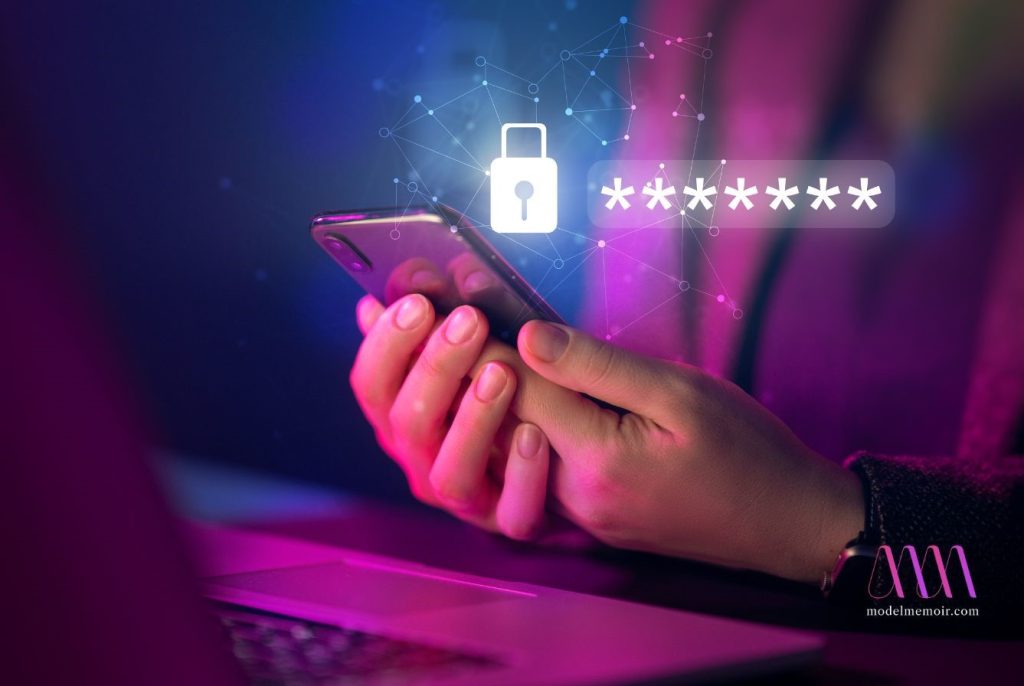If you post on OnlyFans, it’s crucial to keep yourself safe, especially if you’re sharing adult content. The platform is fantastic because it allows you to connect directly with your fans and decide what you want to share.
However, as more people use it, the risks increase. Unfortunately, some individuals aim to exploit the situation. They can steal your money and access personal or intimate details with malicious intent.
It’s essential to protect your data. If someone breaches your account or leaks your content, it can be financially and emotionally devastating.
This article explains how to stay safe while using OnlyFans and what steps to take if the worst happens.
Our goal is to help you use OnlyFans safely, allowing you to focus on content creation without constantly worrying about your data.
Let’s start! Here are some tips to keep you and your information secure. But first, let’s discuss what’s covered in this article:
Security challenges on OnlyFans
Why is OnlyFans a target?
OnlyFans has gained massive popularity in recent years, especially among women sharing adult content. This increased attention has made the platform a target for hackers for several reasons.

Protection of financial and personal data
One primary reason OnlyFans is a hacker target is the enormous amount of financial and personal data handled by the platform. Users pay for subscriptions and often provide credit card and bank details. Creators also store sensitive information in their accounts, like banking details for payouts.
Consider this: OnlyFans handled over $5.5 billion in transactions in 2022, with $4.4 billion going directly to creators. Such a substantial amount naturally attracts cybercriminals. They use various methods to access this data and money, posing significant risks to all users.
Growing user base
The user base on OnlyFans is expanding rapidly. In 2021, OnlyFans had 187.9 million registered users, and by 2023, this number exceeded 210 million. This growth means not only more users but more data entering the system, offering more opportunities for hackers. New users unfamiliar with the platform’s workings and security rules are more vulnerable to attacks like phishing.
Why is this important?
OnlyFans’ popularity and the large financial sums involved mean hackers are actively looking for ways to access this valuable information. Therefore, it’s crucial to understand the security risks associated with the platform and take the necessary precautions to protect yourself and your data.
Common forms of attack
Given its popularity, various attack forms threaten OnlyFans users and creators. Some are particularly prevalent, and being aware of them helps you defend against them.
Phishing
Phishing is one of the most common cybercrime methods you may encounter. Attackers send fake emails or messages that seem to come from OnlyFans or another trusted source. These messages often contain a link that leads to a fake website designed to steal your login credentials.
For example, you might receive an email warning you of a security issue with your account and prompting you to change your password immediately. The link, however, leads to a site almost identical to OnlyFans but created to capture your information.

Account hijacking
Account hijacking occurs when an attacker gains access to your login details, allowing them to control your account. They can change your password, email address, or even post new content under your name, severely damaging your reputation and causing financial loss.
A hacker might gain your password through a phishing email, then log in to your account, change your information, and start exploiting your followers by posting false content or requesting money.
Malware
Malware refers to malicious software aimed at damaging your computer, stealing your data, or otherwise harming you. These programs often spread via emails, fake downloads, or infected websites. Once installed, attackers can access stored passwords, including your OnlyFans login details.
For instance, an email with an attachment that appears to be a benign document actually installs malware on your device, recording everything you type, including passwords.
Doxxing
Doxxing involves publicly sharing your personal information online without your consent. This can be particularly dangerous for OnlyFans creators who frequently share sensitive or intimate content. Attackers might leak your real name, address, or other private information you prefer to keep confidential.
A typical scenario includes a hacker obtaining your real name and address and publishing that information on a public forum, leading to harassment or even physical danger.
Social engineering
Social engineering exploits human nature to extract information or prompt specific actions. Attackers might pose seemingly innocent questions to gain your password or other security details. They often appear friendly or use urgency to get the necessary information.
An example is someone impersonating an OnlyFans employee, calling you to say they need your password for a security check. If you provide it, they immediately access your account.
Impersonation
Impersonation involves creating fake accounts mimicking other users or creators. These accounts deceive followers, extract sensitive information from them, or offer fraudulent services.
Phishers might set up a profile using your photos and data, then request payments from your followers for various services or content, damaging your reputation and causing financial harm.
Payment redirection
Some attackers aim to change the direction of payouts so your earnings go to another account. This usually means accessing your account and altering bank account details or PayPal address used for payments.
In this scenario, the attacker changes the payout info so the next payment goes not to you but to an account they control.
Sextortion
Sextortion is one of the most distressing and dangerous attack forms on OnlyFans. Here, the attacker threatens to release your intimate content publicly unless you pay them or meet other demands.
For example, a hacker gains access to your private OnlyFans material and threatens to share it on social media or send it to your family unless you pay a specific sum.

Content leaks
Content leaks involve attackers downloading and sharing premium OnlyFans content on public forums or other platforms without the creator’s consent. This causes financial loss, as others access your content for free, and violates your privacy.
A “fan” might subscribe to your content, download it, then share it publicly where others can access it for free, causing significant financial and ethical damage.
Fake legal threats
Attackers might send fake legal threats, such as claims of copyright infringement, demanding money to avoid lawsuits. These threats are often professionally written and highly convincing.
You might receive an email from a “lawyer” claiming you’ve violated someone’s rights and demanding immediate payment to avoid a lawsuit.
Fake subscriptions
This involves criminals creating fake subscriber profiles to access your content and then illegally distribute it or misuse it in other ways. These fake subscribers are often bots or accounts managed by cybercriminals rather than real people.
Fake support requests
Attackers often use fake customer support requests that appear to come from OnlyFans’ official support team to extract data. These requests typically aim to get your login details or prompt you to click on malicious links.
For example, a message might claim an issue with your account, asking you to provide details like your password to “fix” the problem.
Content hijacking
Content hijacking involves attackers accessing your account and claiming your uploaded content as their own or modifying it. This jeopardizes your account and the relationship with your audience.
An attacker might gain control of your account, alter or remove your content, causing substantial harm to your follower base.
Fake giveaways and prizes
Attackers sometimes announce fake giveaways and prizes to extract information from users. These scams often ask for personal details like email addresses or credit card information under the guise of claiming a “prize.”
Subscriber manipulation
Attackers might manipulate your subscribers by sending fake messages in your name, asking for money or other benefits. This can severely damage your reputation and lead to financial losses.
These attack forms pose significant risks to your account and personal data. Staying vigilant and knowing how to defend against these threats is crucial. In the next section, we’ll discuss how to prevent such attacks and stay safe on OnlyFans.
How to prevent attacks and stay safe on OnlyFans
Now that we’ve covered common attack methods, let’s see how to protect yourself. These simple steps will help keep your account and personal information safe while using OnlyFans.

Use a strong, unique password
One of the most vital steps is using a strong and unique password. Never use the same password across different platforms. For instance, if you use the same password for Facebook and OnlyFans, a breach on Facebook can let hackers into your OnlyFans account as well. Think of it like using the same key for your home and workplace – it’s too risky.
Choose a password at least 12 characters long, mixing uppercase and lowercase letters, numbers, and special characters. For example, “Jessica1990!” is better than “password123,” but something more complex like “R@b$tYl39*” is stronger.
Enable two-factor authentication (2FA)
Two-factor authentication (2FA) adds an extra security layer, making it harder for hackers to access your account. Along with your password, you’ll need another authentication method, like an SMS code or an app-based code.
Imagine someone has your password but can’t access your account because they don’t have the SMS code. Consider it as needing a fingerprint besides a key to enter your home.
Go to OnlyFans’ security settings and enable 2FA. This is especially useful when using public places or public Wi-Fi, where hackers might try to breach your account.
Be cautious with emails and messages
Phishing is a common way for hackers to steal sensitive information. If an email asks you to change your password due to a “security issue,” always scrutinize the sender and links. For example, links like “onlyfanns.com” or “on1yfans.net” are suspicious and likely not official.
You might also receive messages offering free subscriptions or gifts, but these usually aim to steal your password. Always verify such requests on OnlyFans’ official site instead of clicking on a link in an email.
Use a VPN
Using a VPN (Virtual Private Network) encrypts your internet connection, especially when on public Wi-Fi. This makes it harder for hackers to intercept your data. Picture it as a hidden tunnel where your data travels invisibly to outsiders.
If you’re in a café and using public Wi-Fi, a VPN ensures your data stays out of hackers’ reach. Choose a reputable VPN service that has a good reputation, and always use VPNs on public or unsecured networks.
Regularly update your devices
Keeping your computer, phone, and apps updated is crucial for security. Updates often include patches that protect against recent threats. If your devices run older software versions, they might be vulnerable to newly discovered exploits.
It’s like leaving your home door unlocked because “nothing’s happened before.” Updates are like installing a new lock that burglars can’t pick.

Maintain anonymity
To protect your privacy, consider staying anonymous on OnlyFans. Use a pseudonym and a profile picture that isn’t directly linked to you. For example, if your real name is Jessica, use a name like “JessicaX” or a completely fictional one.
Also, using disposable email addresses and payment methods can help. This is like writing a book under a pen name, hiding your true identity. This way, online activities and personal data stay unconnected.
Back up your important data
Regularly backing up your important data, such as photos and account information, ensures that you don’t lose everything if your account gets hacked. Use a secure location for backups, like encrypted cloud storage or an external hard drive. By doing this, you can quickly restore your data even if something goes wrong.
Monitor your account for suspicious activity
Consistently monitor your account for any suspicious activity. This includes unexpected login attempts, strange messages, or changes to your settings. Quickly addressing these issues can prevent a minor breach from becoming a significant problem.
Educate yourself on the latest security threats
Stay informed about the latest security threats and how to protect against them. You can follow tech news, join online communities, or take online courses. By staying updated, you can be proactive in securing your account.
These steps ensure you and your data remain secure on OnlyFans, allowing you to use the platform without constant fear. The next section discusses what to do if your account is hacked.
What to do if your OnlyFans account is hacked
Despite the utmost precautions, breaches can happen. If your account gets hacked, act immediately to minimize damage and regain control. Here’s a step-by-step guide to respond quickly and effectively.
1. Change your password immediately
First and foremost, change your password if you suspect your account is hacked. This prevents the hacker from further accessing your account. If they’ve changed your password, use the “Forgot Password” option to set a new one.
For instance, if you notice unauthorized access or strange activity, like messages you didn’t send, change your password right away. Also, enable 2FA if you haven’t done so already to prevent future breaches.
2. Enable two-factor authentication (2FA)
If your account isn’t already protected by 2FA, set it up immediately. This adds an extra security layer, making it harder for hackers even if they have your password. You typically receive the 2FA code via SMS or an authentication app.
Imagine someone has your password but can’t log in because 2FA blocks them requiring a code. This protection can stop the attacker from causing more harm.

3. Contact OnlyFans customer support
Reaching OnlyFans customer support is critical. The quickest method is creating a support ticket within the platform. Log in, click your profile icon, select “Help and Support,” and create a detailed ticket describing the issue. Typically, responses come within 1-3 business days.
Alternatively, email [email protected] with detailed information and screenshots if needed. Responses via email also generally take 1-3 business days.
For faster replies, use X (formerly Twitter). Tweet or direct message @OnlyFansSupport. This method can be especially effective if public attention might speed up the response.
4. Check your account settings and connected devices
Once you regain access, review your settings, especially payment information and email. Ensure the hacker hasn’t altered these details. Check the devices logged into your account and log out of unfamiliar ones, then log back in from trusted devices.
For example, if unknown bank account details appear, change them immediately and alert customer support for potential damage recovery.
5. Take necessary steps to prevent further damage
If personal data gets exposed during the attack, act to prevent further harm. Change passwords for accounts using the same password, and notify your credit card company or bank if financial data was compromised.
For instance, if hackers accessed your bank account, inform your bank to monitor suspicious transactions and, if needed, freeze the card to prevent further financial loss.
6. Long-term protection and recovery
After regaining control and averting immediate danger, focus on long-term protection. Learn from the incident and take preventive measures to avoid future issues. Rebuild trust with your followers if your account’s reputation took a hit during the breach.
If the hacker sent fake messages to subscribers, publicly inform them about the situation and assure them the account is now secure.
Conclusion
Using OnlyFans brings many benefits but also inherent risks. Essential defence methods include using strong, unique passwords, enabling two-factor authentication, and using VPNs for encrypted data traffic. Always remain cautious with emails and messages, especially if they seem like phishing attempts, and keep your devices updated with the latest security patches.
In case of an attack, act immediately: change your password, enable two-factor authentication, and contact OnlyFans customer support. These steps help minimize damage and regain control of your account.
By following these security tips, you can enjoy the platform’s advantages while protecting yourself and your data. Awareness and caution are key to making the most of OnlyFans while safeguarding against potential threats.

Questions and answers
Is it safe to use OnlyFans?
OnlyFans can be safe if you follow proper precautions, such as using strong passwords, enabling two-factor authentication (2FA), and being careful with the personal information you share. However, the platform does attract cybercriminals, so always stay vigilant and aware of potential threats like phishing and account breaches.
Can I be tracked on OnlyFans?
You can be tracked on OnlyFans through public information if you’re not careful. To prevent people from discovering your real identity, use a pseudonym and avoid sharing personal details. Additionally, using a VPN can help hide your IP address, providing an extra layer of protection.
Is it safe to put your ID on OnlyFans?
OnlyFans requires identity verification to ensure users are of legal age and eligible for financial transactions. This process is safe as long as it happens directly through OnlyFans. The platform encrypts this data, but never share these details through unofficial channels.
Are free OnlyFans accounts safe?
Free OnlyFans accounts can be safe, but they require extra caution. These accounts may have varied content quality and follower authenticity, increasing risks like content leaks or fake profiles. Free accounts often attract scammers, so always be cautious.
Does OnlyFans delete my data?
According to OnlyFans’ privacy policy, you can delete your account and request data deletion. However, some data, especially related to financial transactions, may be retained due to legal requirements. Before deletion, check what data might remain.
Can I be anonymous on OnlyFans?
Yes, you can remain anonymous on OnlyFans by using a pseudonym and avoiding sharing any personal information that might identify you. To maintain anonymity, use payment methods that aren’t directly linked to your name and avoid using your real name or photo in your profile.
Is OnlyFans safe without VPN?
Using a VPN enhances security by hiding your IP address and encrypting your internet traffic, especially when using public Wi-Fi. Without a VPN, you’re more vulnerable to data interception or tracking of your online activities. It’s possible to use OnlyFans without a VPN, but extra caution is vital.
Is OnlyFans easy to cancel?
Canceling OnlyFans is relatively straightforward. To delete your account, log in, go to account settings, and find the deletion option. This permanently deletes your account and associated data. Save any necessary information before deletion as recovery isn’t possible afterward.
What are the negative effects of OnlyFans?
Using OnlyFans can have negative impacts, particularly on personal data protection and mental health. Intimate content shared can easily leak, leading to severe consequences. Continuous online presence and meeting followers’ expectations can also cause stress and anxiety. Understanding these risks is crucial before committing to the platform.

